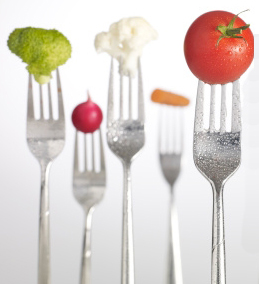Ever Wonder Why When Eating During Depression Leads to More Eating?
By Anthony Heredia | May 31st, 2012 | Category: Fitness Couture | Comments Off on Ever Wonder Why When Eating During Depression Leads to More Eating? We have all been in a low that drives us toward highly processed bad foods, which inevitably deliver that bitter sting of wanting or even more depression, followed by even more bad food. The question is why does the cycle occur, and can you break it? The University of Montreal Hospital has studied brain activity in mice while they enjoyed fattening foods to discover what we all might assume, depressing results. This study published in the Journal of Obesity showed the mice on higher fat diets made no effort to escape when given the opportunity, were overall more lethargic, anxious, and antisocial. Chemically speaking, they produced higher levels of corticosterone, which has a direct association with stress and increased CREB, which affects memory. Mice and humans hold the same dopamine (feel good) hormone release, which severely decreased in this study, resulting in some very depressed mice. The take-away lesson here is that bad feel-good-for-now food will really cloud your thoughts and chemically stress you in even the shiniest of situations; so you might want to rethink your next mood-boosting option. Researcher Stephanie Fulton of the University of Montreal Hospital explains:
We have all been in a low that drives us toward highly processed bad foods, which inevitably deliver that bitter sting of wanting or even more depression, followed by even more bad food. The question is why does the cycle occur, and can you break it? The University of Montreal Hospital has studied brain activity in mice while they enjoyed fattening foods to discover what we all might assume, depressing results. This study published in the Journal of Obesity showed the mice on higher fat diets made no effort to escape when given the opportunity, were overall more lethargic, anxious, and antisocial. Chemically speaking, they produced higher levels of corticosterone, which has a direct association with stress and increased CREB, which affects memory. Mice and humans hold the same dopamine (feel good) hormone release, which severely decreased in this study, resulting in some very depressed mice. The take-away lesson here is that bad feel-good-for-now food will really cloud your thoughts and chemically stress you in even the shiniest of situations; so you might want to rethink your next mood-boosting option. Researcher Stephanie Fulton of the University of Montreal Hospital explains:
 “In addition to causing obesity, rich foods can actually cause chemical reactions in the brain in a similar way to illicit drugs, ultimately leading to depression as the ‘come-downs’ take their toll. We are demonstrating for the first time that the chronic consumption of palatable, high-fat diets has pro-depressive effects.”
“In addition to causing obesity, rich foods can actually cause chemical reactions in the brain in a similar way to illicit drugs, ultimately leading to depression as the ‘come-downs’ take their toll. We are demonstrating for the first time that the chronic consumption of palatable, high-fat diets has pro-depressive effects.”
When experiencing significant stress we crave sweets because our bodies are designed with natural defense mechanisms to store food under pressure. During emergencies and tense situations we will often crave foods high in fat and carbohydrates because they are swiftly converted into usable energy. Under stress, our bodies produce the hormone cortisol, which triggers our bodies to draw any excess calories directly to our abdomens and deposit them as fat. This abdominal fat is quickly mobilized for energy and could be incredibly useful in dangerous situations. However, humans rarely face the same type of dangers that were faced by our ancestors in the wild, so it wouldn’t be logical to cave to our cravings every time we experience a little stress. Fortunately for us, there are a multitude of alternatives to indulging in unhealthy foods when it comes to stress and depression.
1. Yoga- Yoga keeps you limber, in great physical shape, reduces blood pressure, lowers cortisol levels and consequently lowers our stress levels to boot. Those who regularly incorporate yoga into their lives report that they get better sleep and are not as stressed.
 2. Breathing/Meditation- Concentrate on breathing alone for a moment and you would be surprised at the results. Deep breaths clear your mind and flush toxins. Meditation is a powerful positive choice. Find what’s best for you and breathe: http://www.eternity-yoga.com/types-of-meditation.html
2. Breathing/Meditation- Concentrate on breathing alone for a moment and you would be surprised at the results. Deep breaths clear your mind and flush toxins. Meditation is a powerful positive choice. Find what’s best for you and breathe: http://www.eternity-yoga.com/types-of-meditation.html
3. SEX! – Intimacy can be as powerful a stress reliever as many prescription drugs if not obviously better. Sex within a relationship with a caring partner has been proven best since the trust serves as the foundation to completely unwind. The burst of endorphins post orgasm are a recipe for bliss that is sure to eliminate an Armageddon level stress with enough practice, so get to it.
4. Trade Caffeine for Hot Tea- Too much caffeine on a daily basis can chemically disrupt your sleep and cause an increase in stress levels. Opting for tea instead of other caffeinated beverages can not only improve your sleep, but give you a sense of calm and reduce cortisol levels as well.

 5. Eating Clean with Balanced Meals- Although foods high in fat and sugar can give you a temporary lift, we all know that pleasure is short-lived as most of these foods have very little nutritional value. If you want to reduce stress long term, one of the best ways is to eat whole, nutritious foods. Fuel yourself with nutrient-rich vegetables, complex carbohydrates and lean proteins to give your body the energy it needs to feel great and function at its maximum potential.
5. Eating Clean with Balanced Meals- Although foods high in fat and sugar can give you a temporary lift, we all know that pleasure is short-lived as most of these foods have very little nutritional value. If you want to reduce stress long term, one of the best ways is to eat whole, nutritious foods. Fuel yourself with nutrient-rich vegetables, complex carbohydrates and lean proteins to give your body the energy it needs to feel great and function at its maximum potential.
6. Massage- Therapeutic body work flushes out a myriad of toxins stored in the body’s many tissues, increases circulation, releases blocked channels in the body, releases pain-causing tense muscle, resets tissues in spasm, reduces inflammation, and so much more. The powers of therapeutic massage are vast and worth a trip to your local spa for stress relief and a much needed mood boost.
 7. Laughter- Nothing distracts me better than things that make me laugh so hard that I just stop thinking. Laughter therapeutically and chemically shifts our moods in a positive direction, often allowing us to forget our stressors altogether. Find a funny movie, some live comedy, hilarious friends or family who bring smiles and laughter to your life.
7. Laughter- Nothing distracts me better than things that make me laugh so hard that I just stop thinking. Laughter therapeutically and chemically shifts our moods in a positive direction, often allowing us to forget our stressors altogether. Find a funny movie, some live comedy, hilarious friends or family who bring smiles and laughter to your life.
8. Music- Music therapy is a real health profession that uses different types of music to assist people in their various emotional, physical and cognitive needs. The right song, as you well know, can transcend the deepest of stress. When you listen to your favorite music, it chemically changes your mood; and while you are immersed in the melody, your problems drift away.
Resources:
-University of Montreal – Rich foods cause a similar chemical reaction to illicit drugs and the repeated come-downs lead to depression http://www.eurekalert.org/pub_releases/2012-05/uom-sse052212.php
-PubMed – Diet-induced obesity promotes depressive-like behaviour that is associated with neural adaptations in brain reward circuitry http://www.ncbi.nlm.nih.gov/pubmed/22508336
http://www.psychologytoday.com/articles/200311/stress-and-eating?page=2
http://gizmodo.com/5912620/why-eating-when-youre-depressed-makes-you-eat-more
http://stress.about.com/od/tensiontamers/a/stressrelievers.htm








